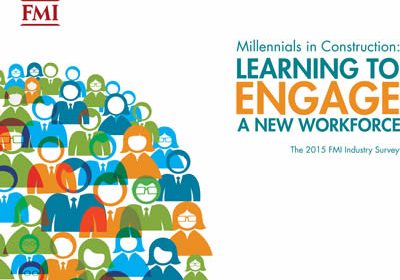An FMI Corp. report based on a national survey of nearly 400 individuals in the construction industry—half born between 1980 and 2000—contends that millennials are dedicated and loyal to their employers and, in terms of career aspirations, attitudes and goals, share similar values with Baby Boomers and Generation Xers.
|
|
| A report pdf can be obtained at www.fminet.com. |
“Millennials in Construction – Learning to Engage a New Workforce” from the Raleigh, N.C.-based management consultant and investment banker finds that an inspiring and well-communicated vision is critical to engaging millennials long term. Among survey respondents, nearly three-quarters expect to remain more than five years with their company; 96 percent are willing to work beyond what is required of them to help the business succeed; 98 percent say it is important for them to understand their career path and opportunities within their company; and, competitive pay, work-life balance, and personal development lead choices for staying engaged.
Like other generations that enter the workplace, report authors note, millennials a) have new perspectives to share, ideas about getting things done, and ways of tackling problems; b) want to do more than just punch a clock and take home a paycheck; and, c) are looking to add value, make an impact and find meaning in what they are doing.
“Millennials are willing to work hard and put forth effort when their company provides interesting and challenging work assignments that provide opportunity for career advancement,” says contributing author and FMI Research Analyst Paul Trombitas.
The 24-page report provides practical insights on how to get started with developing a comprehensive talent strategy and a culture of engagement, including specific implications for the young workforce.
BABY BOOMER CRITIQUE
- Reluctance to change and adapt;
- Unwillingness to learn new ways of doing business;
- Inability to relate to younger generation;
- Don’t want to take us seriously; and,
- Less accepting of female workers, especially those without college degrees.
- Their attitude toward hard work;
- Their perspective, knowledge and experience;
- They are honest and you know what is expected;
- Detail-oriented mentoring and involvement; and,
- Ability to teach.
